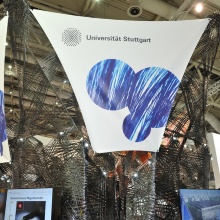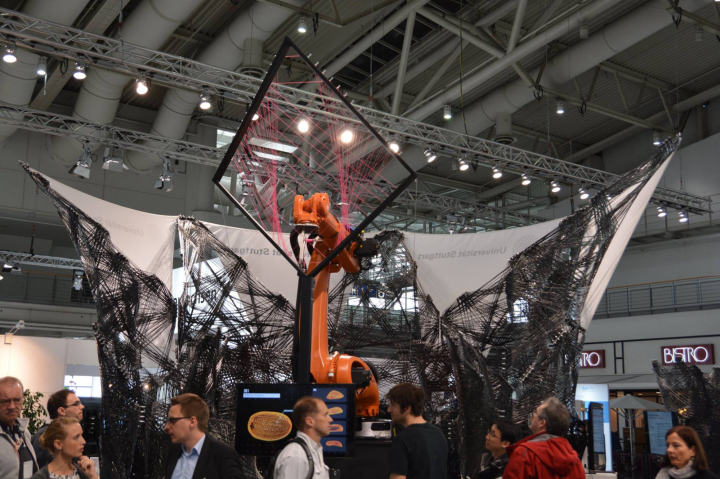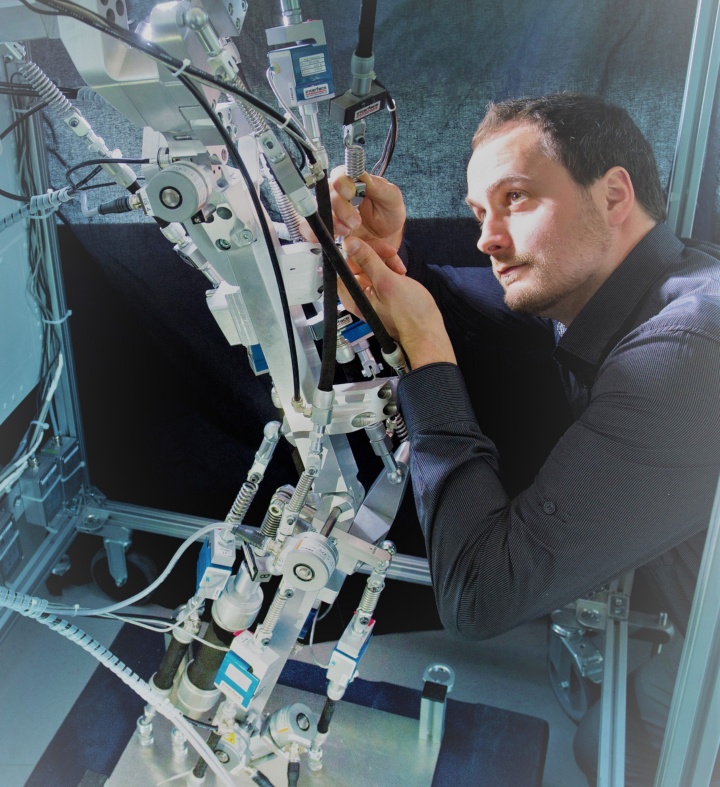Over the past years of international trade fair commitment by the University of Stuttgart, experience has shown that the industrial fair in Hannover with its leading fair “Research & Technology“ in Hall 2 provides the ideal forum in order to present to an interested world audience the achievements of the research university at the cutting edge of scientific-technological development. In this way the University of Stuttgart will also be showing this year its future-oriented research findings at the Hannover Fair 2018, the global exhibition forum along the entire industrial value-added chain. As a co-exhibitor at the “Baden-Württemberg joint stand“, that is organised by Baden-Württemberg International (bw-i), the competence centre of the state for the internationalisation of business, science and research, the University will be presenting exhibits of its cutting-edge research again to the fair audience from all over the world.
The fair appearance by the University of Stuttgart at the world’s largest industrial show is taking place from 23rd until 27th April. The exhibition sector for research, development and technology transfer “Research & Technology“ will be showing visionary products and applications and as a major attraction at the Hannover Fair will be bringing representatives from business, science and politics together. Once again the exhibits from the University of Stuttgart will illustrate research and development as main pillars of the economy.
With a view to the fair commitment in Hannover, Professor Wolfram Ressel, Rector of the University of Stuttgart, emphasises the necessity for society to promptly transfer findings from research to industrial innovation: “The University of Stuttgart is an innovative, reliable and acknowledged partner for knowledge and technology transfer in business, science and society. It is one of our strategic goals to enable our industrial partners access to our research achievements as efficiently as possible.“
Fair stand as exhibit
The University of Stuttgart fair stand, that will be constantly developed in front of the visitors by a KUKA robot, is already planned as an exhibition object itself with which the latest, material-efficient construction and process technology will be demonstrated. The carbon-fibre reinforced lightweight structure of the fair stand was built through computer-aided design and simulation tools as well as an innovative, coreless robotic winding process for fibre composite components. The Institutes for Computer-Based Design and Construction (ICD) and for Supporting Structures and Structural Design (ITKE) responsible for the design and manufacturing of the fair stand illustrate with the construction innovative design scopes for architecture. The innovative manufacturing technology of the robotic filament winding is integrated in early design phases in order to ensure a material-efficient construction method meeting the demands of production.
Moreover, ICD and ITKE will be demonstrating the robotic filament winding as well as several architectural research projects that emerged from collaborations with various institutes at the University.
ARENA2036
ARENA2036 is the largest research campus for hardware-based knowledge work in the field of mobility and production of the future worldwide. Here experts from science and business will have the opportunity to come together, to research disruptive project ideas and thus to design the mobility concepts of the future. This makes ARENA2036 a driving force for the sustainable automobile manufacturing of the next automobile generation.
With the young Stuttgart start-up ThingOS from ARENA2036 the University will be presenting a technology spin-off that enables technology-independent smart applications for home, office and industrial environments to be developed and operated. These innovative “Smart Space Apps“ are not implemented on smart phones but in the environment and enable the smooth and safe cooperation between devices from the most diverse communication technologies, device platforms and manufacturers. Among other things ThingOS will be demonstrating at the fair stand the link of industry real-time bus sensors with wireless sensors and mobile terminal devices.
Furthermore, ARENA2036 will be exhibiting a screw assistant at Stand B22 of the Federal Ministry for Education and Research in Hall 2, that supports the blue-collar worker in repetitive and ergonomically challenging work. Humans and robots interact with each other with the help of innovative sensor technology. In addition process sequences can be programmed intuitively and quickly without existing robot insights. This innovative procedure was researched and developed by ARENA2036 partner Daimler in cooperation with the German Aerospace Centre (DLR) and BÄR Automation.
Excellence Cluster SimTech
The Stuttgart Centre for Simulation Science (SC SimTech) at the University of Stuttgart develops simulation technology that is necessary to solve complex problems in the most diverse areas of daily life. This also includes computer simulations from the field of medicine and the life sciences. The central vision of SimTech researchers in this field is to develop a model with which the physical behaviour of the human body can be better understood: a digital twin of the human. Professor Syn Schmitt and his team “Biomechanics and Biorobotics“ are investigating in this context the interaction between the neural control of movement and the muscle-skeletal system. Among other things their research is to contribute towards developing innovative prostheses or exoskeletons.
At the fair the researchers will be showing a bio-inspired robot of a human leg that is moved by artificial muscles. The so-called bio-robot makes the interaction between motion control and motion performance in the real physical world comprehensible for scientists.
Centre for Integrated Quantum Science and Technology
Together with the Max-Planck Institute for Solid State Research in Stuttgart the Universities of Stuttgart and Ulm have founded an interdisciplinary Competence Centre for Quantum Science and Technology (IQST) that extends beyond the borders of the institutions and locations. The advancing miniturisation inevitably leads to the world of the smallest particles where the laws of quantum physics govern. In order for the leap from basic research to appliacation to succeed, the scientists at IQST are not only working together jointly with engineers but are also maintaining close contact with partners from industry, in particular in Baden-Württemberg with the companies Bosch, Zeiss and Bruker.
In order to clearly illustrate to the fair visitors quantum physical phenomena, scientists from the Centre for IQST will be presenting exciting interactive exhibition experiments at the fair stand. Among other things this includes a mini golf game that is based on quantum mechanical effects. Fair visitors will thereby experience a surprising effect: the golfball appears in the several locations at the same time. Those interested can attempt to maximise the probablility of presence in the hole. A prototype of a quantum magnetometer will also be demonstrated on which the vistitors will be able to diretly experience the influence of magnetic fields on spin-based quantum systems.
Bio-based materials and cycles of materials in architecture
The research department “Bio-Based Materials and Cycles of Materials in Architecture (BioMat)” aims at bringing together the fields of design, sustainable material development, form finding, fabrication, biomimetics, space realisation and intelligent systems in architecture. Teaching, research, material development and production as well as industrial projects are strongly connected. BioMat offers architecture students and industrial partners the opportunity to participate in current research projects in the framework of sustainable and intelligent building systems. One of the missions of the architects and engineers at BioMat is to examine various sustainability aspects in architecture.
Cyber Valley
Intelligent systems will become important in future in an increasing number of areas: very soon they could be chauffeuring us as autonomous vehicles, supporting us in everyday life as household helps, take over rescue missions that are dangerous for humans or diagnose and fight diseases in the human body as minute robots. Artificial intelligence is therefore considered the key technology of the 21st century. No wonder then that basic research as well as the industry worldwide are working on further boosting the intelligence of machines.
The research and development of artificial intelligence is now being bundled in the region of Stuttgart-Tübingen by the Cyber Valley. In this research association, sponsored by the State of Baden-Württemberg, the Max-Planck Institute for Intelligent Systems with its two locations in Tübingen and Stuttgart, the University of Stuttgart and the University of Tübingen is joining forces with eight partners from industry.
The researchers at the trade fair will be demonstrating an autonomous bicycle. Different to a traditional bicycle, this is guided by the rear wheel. The specially developed algorithm ensures that the bike remains stable and is able to drive itself.
Institute for Electrical Power Conversion
In Hall 27 the Institute for Electrical Power Conversion from the University of Stuttgart that researches in the fields of electrical machines and contactless energy transfer will be presenting itself. These main topics are decisive aspects on the path to sustainable electromobility.
The exhibit schematically shows the interaction of various test benches of the higher education institutions and universities in Baden-Württemberg. These were linked in the framework of the project “XiL-BW-e FrameworkBased XiL-Laboratory Network BW for Electromobility“. The University of Aalen, the Esslingen University of Applied Sciences, the Karlsruhe Institute for Technology, the University of Stuttgart and the University of Ulm are participants.
With the help of the test bench network, the most varied scenarios of electrical and hybrid driving can be illustrated. Through this prototype phases can be significantly shortened since individual components can be tested in the entire system at an early stage.





